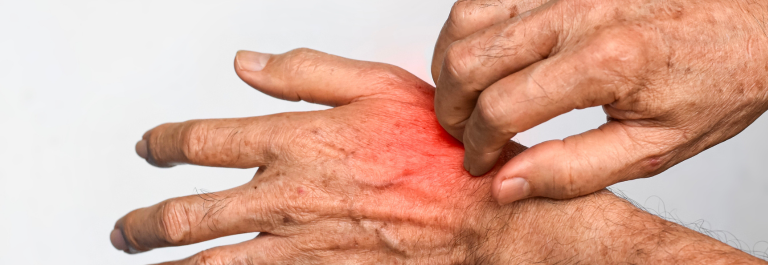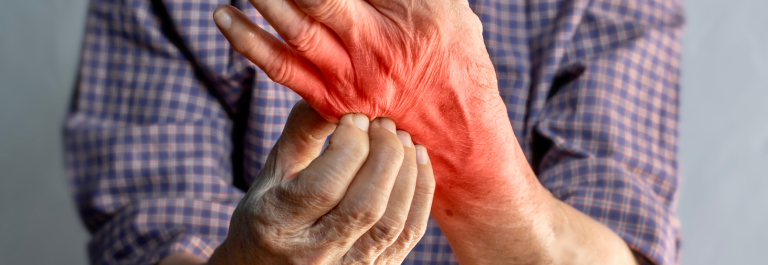Imagine waking up with itchy, inflamed skin that just won't go away, no matter how much cream you apply. Now, imagine this condition is linked not just to what you put on your skin, but to your weight. Surprising as it might sound, recent research suggests that weight gain might be a significant factor in developing or worsening eczema symptoms. In this blog, we will explore:
-
The correlation between obesity and eczema.
-
How weight gain may induce skin inflammation, swelling, and discoloration.
-
Natural ways to look after your skin
Read on to understand how weight management can play a role in alleviating eczema symptoms and improving overall skin health.
The Correlation Between Obesity and Eczema
Eczema, especially atopic dermatitis, is a chronic skin condition that causes persistent itching and inflammation. Interestingly, there's a notable connection between obesity and eczema. Research indicates that the systemic inflammation linked to obesity can worsen eczema symptoms. As a result, obese individuals often experience more severe manifestations, such as ooziness or leaking fluid from the skin and developing thick, leathery patches.
With obesity on the rise globally, chronic conditions like eczema are becoming more prevalent. Inadequate blood flow, insulin resistance, and poor circulation in obese individuals contribute to various skin issues, including stasis dermatitis. This condition is characterized by skin inflammation, swelling, and discoloration, further complicating the management of eczema.
How Does Weight Gain Induce Skin Inflammation?
Weight gain can significantly impact skin health by inducing inflammation. When a person is overweight or obese, the excess fat tissue can produce inflammatory cytokines, leading to systemic inflammation. This inflammation can manifest in the skin, causing symptoms of atopic dermatitis, such as rashy or discolored skin, itching, dryness, or even leathery or thick skin.
Furthermore, being overweight can lead to increased body heat and moisture, creating an environment where skin conditions like eczema can thrive. Obese individuals may also be more prone to skin infections such as folliculitis, candidiasis, furunculosis, and erythrasma, which can further aggravate eczema.
Managing Eczema Through Weight Loss
Given the correlation between obesity and eczema, adopting a weight loss program may help in reducing eczema symptoms. A calorie-restricted diet, combined with regular exercise, can aid in losing weight, which in turn can decrease systemic inflammation and improve skin health.
Losing weight can lead to fewer symptom flare-ups and reduced itching, making it easier to manage eczema. For those with severe atopic dermatitis, treated through medical interventions, weight loss can complement these treatments, enhancing their effectiveness.
Weight loss can also help improve blood circulation, reducing the risk of conditions like stasis dermatitis and enhancing overall skin health. By managing their weight, individuals can potentially reduce the burden of eczema and improve their quality of life.
Tips and Recommendations for Eczema Symptoms
By following the below tips and incorporating them into your daily routine, you can better manage the interplay between weight gain and eczema, reducing skin inflammation and improving your overall skin health.
Moisturize Regularly
Keeping the skin hydrated is crucial for maintaining its barrier function. We recommend our eczema cream - our Organic Manuka Skin Soothing Cream, which combines the healing properties of Manuka honey with just five other natural ingredients to soothe and hydrate eczema-prone skin effectively.
Take Lukewarm Showers
Hot water can strip the skin of its natural oils, leading to dryness and irritation. Stick to lukewarm showers and limit their duration to prevent exacerbating eczema symptoms.
Pat Dry, Don’t Rub
After bathing, gently pat your skin dry with a soft towel instead of rubbing it. This helps avoid unnecessary irritation and allows your moisturizer to be more effective.
Wear Breathable Clothing
Non-breathable fabrics can trap heat and sweat, aggravating eczema. Keep your skin cool and comfortable throughout the day with our Remedywear clothing. This line of clothing is designed specifically for eczema sufferers, featuring breathable, moisture-wicking fabrics that reduce irritation and promote skin healing. The garments are made with sustainable materials and embedded with zinc, known for its anti-inflammatory and antibacterial properties.
Maintain a Healthy Diet
A balanced diet rich in anti-inflammatory foods can help reduce systemic inflammation. We recommend incorporating plenty of fruits, vegetables, whole grains, and lean proteins while avoiding processed foods and excessive sugar intake. You might also consider natural topical treatments like our beef tallow cream to complement your anti-inflammatory approach.
Stay Hydrated
Drinking plenty of water supports overall skin health and helps maintain hydration from the inside out. Aim for at least eight glasses of water a day to keep your skin supple and hydrated.
Avoid Known Allergens
If you have specific allergies that trigger eczema flare-ups, it's important to take steps to avoid these allergens. This might include using hypoallergenic products and avoiding certain food allergies or environmental triggers.
Manage Stress
Stress can exacerbate eczema symptoms and contribute to weight gain. Incorporating stress-reducing practices such as yoga, meditation, or regular exercise can help keep both your skin and weight in check.
Take Control of Your Eczema and Weight Today
Follow these tips to help you manage your eczema symptoms and understand the impact that weight gain can have on your skin health. By adopting a healthier lifestyle and striving to lose weight, you can reduce inflammation, improve your skin condition, and enhance your overall well-being.



